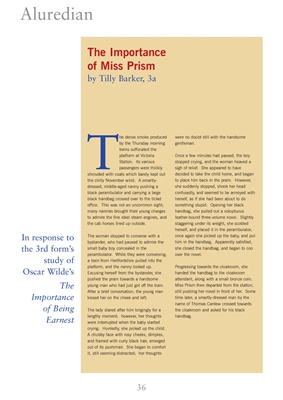
In response to
the 3rd form's
study of
Oscar Wilde's
The
Importance
of Being
Earnest T
he dense smoke produced
by the Thursday morning
trains suffocated the
platform at Victoria
Station. Its various
passengers were thickly
shrouded with coats which barely kept out
the chilly November wind. A smartlydressed,
middle-aged nanny pushing a
black perambulator and carrying a large
black handbag crossed over to the ticket
office. This was not an uncommon sight;
many nannies brought their young charges
to admire the fine steel steam engines, and
the cab horses lined up outside.
The woman stopped to converse with a
bystander, who had paused to admire the
small baby boy concealed in the
perambulator. While they were conversing,
a train from Hertfordshire pulled into the
platform, and the nanny looked up.
Excusing herself from the bystander, she
pushed the pram towards a handsome
young man who had just got off the train.
After a brief conversation, the young man
kissed her on the cheek and left.
The lady stared after him longingly for a
lengthy moment; however, her thoughts
were interrupted when the baby started
crying. Hurriedly, she picked up the child.
A chubby face with rosy cheeks, dimples,
and framed with curly black hair, emerged
out of its pushchair. She began to comfort
it, still seeming distracted; her thoughts
were no doubt still with the handsome
gentleman.
Once a few minutes had passed, the boy
stopped crying, and the woman heaved a
sigh of relief. She appeared to have
decided to take the child home, and began
to place him back in the pram. However,
she suddenly stopped, shook her head
confusedly, and seemed to be annoyed with
herself, as if she had been about to do
something stupid. Opening her black
handbag, she pulled out a voluptuous
leather-bound three-volume novel. Slightly
staggering under its weight, she scolded
herself, and placed it in the perambulator;
once again she picked up the baby, and put
him in the handbag. Apparently satisfied,
she closed the handbag, and began to coo
over the novel.
Progressing towards the cloakroom, she
handed the handbag to the cloakroom
attendant, along with a small bronze coin.
Miss Prism then departed from the station,
still pushing her novel in front of her. Some
time later, a smartly-dressed man by the
name of Thomas Cardew crossed towards
the cloakroom and asked for his black
handbag.
Aluredian
36
The Importance
of Miss Prism
by Tilly Barker, 3a